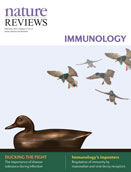|
Advertisement | |||||||||||||||||||||||||||||||||||||||
| |||||||||||||||||||||||||||||||||||||||
| TABLE OF CONTENTS | |||||||||||||||||||||||||||||||||||||||
| February 2017 Volume 17 Number 2 | |||||||||||||||||||||||||||||||||||||||
| In this issue
| ||||||||||||||||||||||||||||||||||||||
| |||||||||||||||||||||||||||||||||||||||
 | |||||||||||||||||||||||||||||||||||||||
| |||||||||||||||||||||||||||||||||||||||
| REVIEWS | Top | ||||||||||||||||||||||||||||||||||||||
| Disease tolerance and immunity in host protection against infection Miguel P. Soares, Luis Teixeira & Luis F. Moita p83 | doi:10.1038/nri.2016.136 Disease tolerance is a defence strategy that functions by improving tissue repair or by reducing the detrimental effect of inflammatory signals to prevent the harmful effects of pathogens. This Review describes the mechanisms underlying disease tolerance to infections and how these can be targeted therapeutically. Abstract | Full Text | PDF | |||||||||||||||||||||||||||||||||||||||
Immunogenic cell death in cancer and infectious disease Lorenzo Galluzzi, Aitziber Buqué, Oliver Kepp, Laurence Zitvogel & Guido Kroemer p97 | doi:10.1038/nri.2016.107 Initiation of an adaptive immune response depends on the detection of both antigenic epitopes and adjuvant signals. Infectious pathogens and cancer cells often avoid immune detection by limiting the release of danger signals from dying cells. When is cell death immunogenic and what are the pathophysiological implications of this process? Abstract | Full Text | PDF | |||||||||||||||||||||||||||||||||||||||
| Mechanisms of immunomodulation by mammalian and viral decoy receptors: insights from structures Jan Felix & Savvas N. Savvides p112 | doi:10.1038/nri.2016.134 Understanding how decoy receptors for cytokines and chemokines work requires in-depth insights into their structure. In this Review, the authors provide a structural overview of both mammalian and viral decoy receptors and highlight opportunities for leveraging their immunomodulatory activity for therapeutic purposes. Abstract | Full Text | PDF | Supplementary information | |||||||||||||||||||||||||||||||||||||||
| RNA-binding proteins in immune regulation: a focus on CCCH zinc finger proteins Mingui Fu & Perry J. Blackshear p130 | doi:10.1038/nri.2016.129 In this Review, the authors summarize recent findings that illustrate the emerging roles of CCCH zinc finger proteins, which are involved in the regulation of multiple steps of RNA metabolism, in the regulation of immune responses including cytokine production, immune cell activation and immune homeostasis. Abstract | Full Text | PDF | Supplementary information | |||||||||||||||||||||||||||||||||||||||
| CORRESPONDENCE | Top | ||||||||||||||||||||||||||||||||||||||
| The complement system is also important in immunogenic cell death Junfei Jin & Songqing He p143 | doi:10.1038/nri.2016.142 Full Text | PDF | |||||||||||||||||||||||||||||||||||||||
| Reply: The complement system is also important in immunogenic cell death Lorenzo Galluzzi, Aitziber Buqué, Oliver Kepp, Laurence Zitvogel & Guido Kroemer p143 | doi:10.1038/nri.2016.143 Full Text | PDF | |||||||||||||||||||||||||||||||||||||||
| |||||||||||||||||||||||||||||||||||||||
You have been sent this Table of Contents Alert because you have opted in to receive it. You can change or discontinue your e-mail alerts at any time, by modifying your preferences on your nature.com account at: www.nature.com/myaccount For further technical assistance, please contact our registration department For print subscription enquiries, please contact our subscription department For other enquiries, please contact our feedback department Nature Publishing Group | One New York Plaza, Suite 4500 | New York | NY 10004-1562 | USA Nature Publishing Group's worldwide offices: Macmillan Publishers Limited is a company incorporated in England and Wales under company number 785998 and whose registered office is located at The Campus, 4 Crinan Street, London, N1 9XW. © 2017 Nature Publishing Group, a division of Macmillan Publishers Limited. All Rights Reserved. |
 |









No comments:
Post a Comment